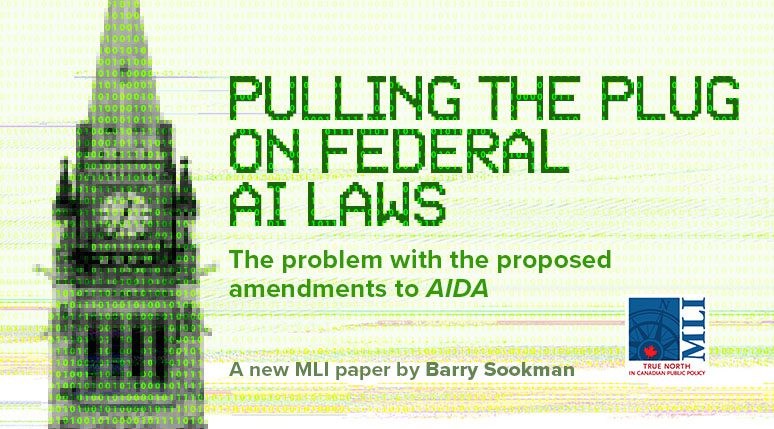By Barry Sookman
June 25, 2024
Executive Summary
In 2022, the federal government led by Prime Minister Justin Trudeau introduced a deeply flawed and extremely troubling piece of legislation intended to deal with a relatively new but fast-growing field, Artificial Intelligence (AI).
AI is an incredibly complex technology with the potential to literally change the world – for better and for worse. Given the high stakes, Canada should certainly not rush headlong into adopting new regulations that potentially put it at odds with other leading nations. Indeed, while the European Union has enacted its own legislation that will undoubtedly influence countries around the globe, many G7 countries have rejected the EU regulatory approach opting instead for enhancing interoperable governance processes.
For Canada, the wisest choice would be to take a wait-and-see approach and follow the lead of the powerful and influential trading partners like the United States, the United Kingdom, and others.
Unfortunately, it appears that Canada is stubbornly intent on going its own way with regards to AI legislation. As part of Bill C-27, known as the Digital Charter Implementation Act, 2022, the federal government proposed to regulate “high-impact” AI systems under the Artificial Intelligence and Data Act (AIDA).
After AIDA was widely panned by a host of experts, François-Philippe Champagne, the minister of Innovation, Science, and Industry, eventually produced a letter that contained a series of proposed amendments to AIDA – essentially, a series of clarifications and new regulations that would be part of AIDA 2.0.
While the minister’s letter helped clarify some of the issues with AIDA, the proposed changes are still problematic and very concerning.
Indeed, if enacted, the amendments would impose many new regulatory requirements never even hinted at when AIDA was first tabled. Furthermore, the amendments still fail to address many of the key criticisms levied against Bill C-27, and raise a host of new problems, including:
- The initial list of “high-impact” systems is too broad and gives no clear guidance on what the government intends to regulate.
- AIDA undermines parliamentary sovereignty by placing too much power into the hands of bureaucrats at Innovation, Science, and Economic Development Canada (ISED). Under the proposed legislation, ISED would be able to establish regulations and then enforce the regime by imposing shut-down orders and administrative fines, with no rights of appeal.
- The amendments too are vague with regards to “harms” associated with the initial list of AI systems to be regulated. The minister offered some guidance in his letter, but it has no legal effect and does not constrain what can be regulated.
- AIDA increases bureaucratic confusion and enables ISED to potentially interfere in the jurisdictions of other government departments and agencies.
Moreover, AIDA threatens to hinder Canada’s innovation ecosystem. We must recognize that AI will be essential to Canada’s economy and security. A policy failure in this area could be catastrophic and plunge Canada into a third world-nation status. We cannot afford to get things wrong with AI.
Since most G7 countries are still debating the best ways to regulate AI, and since the agreed to G7 approach is to achieve interoperability in governance frameworks, the prudent choice for Canada would be to take a “wait-and-see” approach. There is simply no need for a middle country like Canada to move at breakneck speed to enact a law that could and likely will be out of step with those of our major trading partners – particularly when there has been scant public consultation and debate in Canada about how AI systems should be regulated.
Unfortunately, AIDA, as introduced into Parliament, is nothing but a shell of a law. It passed first and second reading in that form. And now, the committee that is studying the legislation has concluded its hearings and has already started a clause-by-clause review of Bill C-27.
The committee is now faced with assessing new amendments in a very short period that will regulate one of the most transformative technologies of our time. What Parliament does to regulate AI could have far-reaching implications on public safety and other potential harms and on innovation. We must get this right. This means taking adequate time for all stakeholders to properly assess the policy and technical aspects of amendments.
Read the full paper here:







